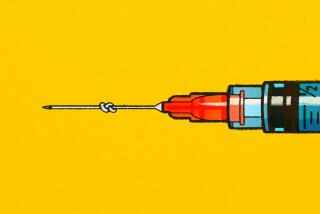Retin-A Warning : Some Doctors Say the Anti-Wrinkle ‘Miracle’ May Cause More Ill Than Good
- Share via
WHEN researchers recently announced the wrinkle-diminishing effects of Retin-A, the topical drug used to treat acne, doctors and pharmacists were bombarded with requests. Hailed as a major breakthrough--and considered a miracle treatment by those hoping to reduce wrinkles--Retin-A is more effective against lines caused by sun exposure than it is against the sagging wrinkles caused by gravity, researchers say. They caution that practices need to be revised while using the drug. Without appropriate skin care, Retin-A may do more harm than good.
Many cleansing regimes involve exfoliation, a process that sloughs dead cells from the skin’s surface. “People who use Retin-A should not use any form of abrasion. Even a washcloth might make your skin sore,” says Dr. John Voorhees, the dermatologist who directed the headline-making Retin-A study at the University of Michigan Medical Center in Ann Arbor.
Voorhees adds that because Retin-A treatment for wrinkles is so new (he made the announcement about its effectiveness as a wrinkle reducer in January), many doctors are still not fully familiar with it. He cautions: “Retin-A can irritate your skin--especially if your doctor doesn’t know how to prescribe it.”
One of the reasons that Retin-A, a form of Vitamin A acid, diminishes wrinkles is that it exfoliates the skin, Voorhees explains. Retin-A exfoliation is much greater than any non-prescription procedure or product. Flaking, redness and irritation are temporary side effects. Further exfoliation with a granular cleanser, “clarifying” or “scruffing” lotions, rough sea sponges or Buf-Puf-type products could cause irritation, he says.
Dr. Jerome Litt, a dermatologist at Case Western Reserve University School of Medicine and author of “Your Skin & How to Live in It,” suggests that Retin-A users wash with a gentle cleanser such as Cetaphil lotion or Lowila Cake, over-the-counter products that are often used to cleanse babies who have eczema.
Clinique, whose ads extol the virtues of exfoliation, has instructed its sales staff to “always ask if customers are using any drugs on their skin,” according to Iris Model, senior vice president of the firm. “On the advice of our consulting dermatologists, we have directed our consultants to have clients reduce the use of exfoliation either in frequency or in strength and to increase emolliation (moisturizing) when using Retin-A.”
“The other critical point is the need for sun protection,” Model says.
Litt explains that the skin’s top layer--the stratum corneum--provides some sun protection, but Retin-A thins it, thus dramatically reducing its protection. The skin is much more vulnerable to ultraviolet rays. He suggests using a product with a sun protection factor (SPF) of at least 29.
“Someone using tretinoin (the generic name for Retin-A) would be crazy to go out in the sun without protection,” Voorhees says. “You could end up with more wrinkles than you would have had without Retin-A.”
Photographed by David Roth; hair and makeup by Jeanne Townsend/Celestine-Cloutier; model: Nancy Sheppard/Prima; styling: Melody Sachs/A la Mode.




